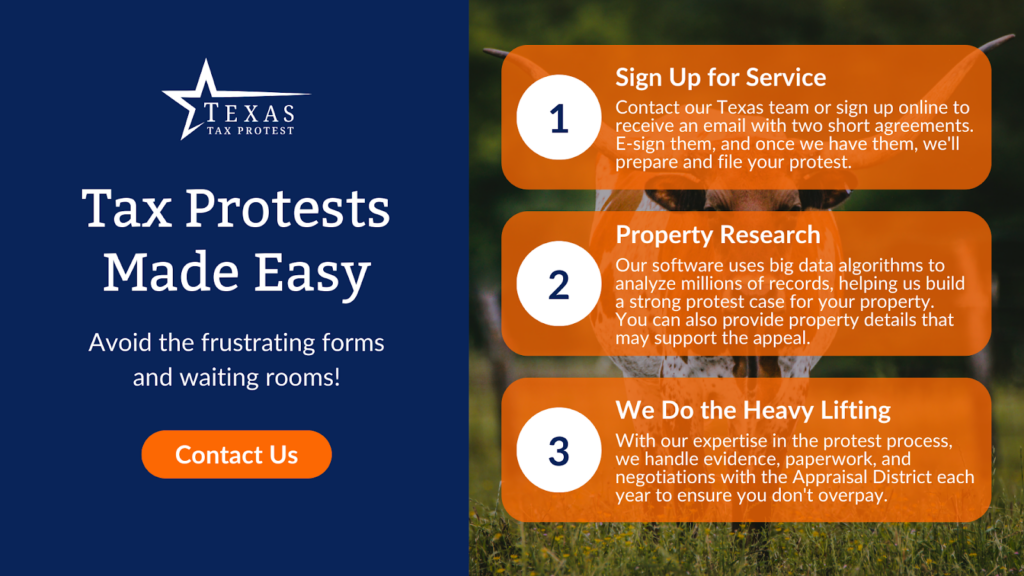
Nueces County Property Taxes: A Guide to Protesting and Reducing Your Bill
April 14, 2025
Key Takeaways:
- How Property Taxes Are Calculated: Your property tax bill in Nueces County is based on your appraised value, applicable exemptions, and the local tax rates set by various jurisdictions. Comparable sales and mathematical adjustments also play a key role in determining values.
- Why You Should Consider Protesting: Overvalued assessments, missed exemptions, or incorrect property details can lead to inflated tax bills. If your valuation doesn’t reflect market realities, protesting your assessment may result in meaningful savings.
- Steps to File a Protest: Filing a protest starts with reviewing your assessment notice, researching comparable sales, and submitting your evidence by the deadline. Texas Tax Protest can represent you and help prepare a clear case if a hearing is scheduled.
Nueces County property owners shoulder some of the highest tax rates in the nation, a reality many accept without realizing how much they could be saving. In Texas, inflated assessments and overlooked exemptions can lead to steep bills that don’t reflect a property’s true market value.
Texas Tax Protest helps homeowners and commercial property owners across Nueces County reduce their tax liability through precise, data-backed protests and exemption filings. Our team pairs local expertise with advanced tools to challenge unfair valuations and advocate for fairer outcomes.
In this guide, we’ll examine how tax values are calculated, when to protest, and how to approach the process strategically to protect your bottom line.

How Nueces County Calculates Property Taxes
Property taxes in Nueces County are based on several moving parts. Each step in the process, from valuation to exemptions and local tax rates, affects your total bill. Learning how these elements work together can help you decide when a protest is worth pursuing and how much you might be overpaying.
Appraised Value: The Starting Point
Every Nueces County property tax bill begins with the appraised value assigned by the Nueces County Appraisal District. This estimate reflects what your home, commercial building or land would likely sell for on the open market. Appraisers consider recent sales of similar properties nearby, improvements made to the structure, and current real estate trends across the region. This figure becomes the foundation for your tax calculation.
Taxable Value: Adjusted Through Exemptions
Texas uses a 100 percent assessment ratio, which means the taxable value is usually identical to the appraised value unless exemptions apply. Homeowners can apply for a general residence homestead exemption. Seniors, veterans, and individuals with disabilities may also qualify for additional reductions. These exemptions lower the portion of your property value that is subject to taxation and can lead to noticeable savings.
Local Tax Rates and How They’re Applied
Once the taxable value is determined, your total property tax bill depends on rates set by local taxing entities. These may include Nueces County, the school district, your city, and other jurisdictions such as hospital or college districts. Each body sets its tax rate, which is multiplied by your taxable value to calculate what you owe. Rates are reviewed annually and can shift depending on budgets and local funding needs.
Comparable Sales and Mathematical Adjustments
Appraisal districts review comparable sales data, or comps, to estimate property values during annual assessments. However, the comparison does not stop with a list of sale prices. Adjustments are made to account for differences in condition, square footage, age, and features between properties. For example, if a neighboring property sold for more but includes upgrades or extra square footage, the appraisal district should lower the comparable value before applying it to your assessment.
Common Reasons to Protest Your Property Valuation
Regarding property taxes, your home’s assessed value can feel like a mysterious number pulled from thin air. But there are concrete reasons why you might want to challenge that valuation. Here are some common scenarios where protesting your property tax assessment makes sense:
- Overvaluation: If your property’s assessed value is higher than its actual market value, you’re likely paying more than you should. Comparing your assessment to recent sales of similar properties in your area can reveal if your valuation is out of line.
- Unequal Appraisal: Texas law requires that properties within the same taxing unit be appraised equally. If you find that similar properties in your neighborhood are assessed at lower values, you might have a case for unequal appraisal.
- Damage or Deterioration: If your property has suffered significant damage or deterioration since the last assessment, its value should reflect that. Documenting the condition of your property can support your protest, whether it’s from a natural disaster, neglect, or other factors.
- Incorrect Data: Sometimes, incorrect information is the simplest reason for a high valuation. If the tax assessor has the wrong square footage, number of bedrooms, or other key details, it can inflate your assessment. Double-checking the data used in your valuation can uncover these errors.
- Exemptions Not Applied: If you qualify for exemptions like homestead, over-65, or disability, but they haven’t been applied to your assessment, you’re missing out on potential savings. Ensuring all eligible exemptions are accounted for can significantly lower your tax bill.
How to File a Property Tax Protest in Nueces County
Texas property tax laws allow you to challenge an inaccurate property valuation. Protesting that value starts with knowing what to look for, how to gather evidence, and how to make your case. Here’s a breakdown of the key steps involved and how Texas Tax Protest can help.
Review Your Assessment Notice
The first step in any property tax protest is reviewing your Notice of Appraised Value from the Nueces County Appraisal District. This document lists your property’s appraised value and informs you of your right to protest. Read it closely and note the deadline for submitting your protest. In most cases, Texas residents must file by May 15 or within 30 days of receiving the notice.

Gather Evidence and Comparable Sales
Next, you must research comparable property sales that support a lower valuation. These should be similar in size, age, location, and condition. You’ll also need to apply mathematical adjustments between properties to make a strong case. For example, a higher-priced comp with more square footage should be adjusted downward to reflect the difference.
Texas Tax Protest helps clients gather and analyze this data. Our team uses advanced tools to evaluate comps accurately and apply the appropriate adjustments. We take care of the research so you can focus on the outcome.
Submit Your Protest
Once your evidence is ready, you can file your protest with the Nueces County Appraisal District. This can typically be done online or by mail. Be sure to include all supporting documentation and reference any exemptions that may apply to your property. Missing the deadline can disqualify your protest, so submitting everything on time is important.
Prepare for the Appraisal Review Board Hearing
If your protest isn’t resolved informally, you’ll be scheduled for a formal hearing before the Appraisal Review Board (ARB). This is where you’ll present your case and explain why the assessed value should be lowered. Solid documentation and a clear explanation of comps and adjustments will help you make a convincing argument.
Let Us Represent You
During the hearing, you or your representative will walk the ARB through your evidence and explain the reasoning behind your valuation. This includes showing comps, detailing property issues, and demonstrating where the original appraisal may have missed key factors. Texas Tax Protest can handle this presentation on your behalf. Our team communicates directly with the ARB and presents all necessary evidence to support your appeal.
Review the Outcome and Next Steps
After the hearing, the ARB will issue a decision. If your protest is successful, your tax liability will be lowered to reflect the new value. If the board denies your protest, you may still have the option to appeal to the State Office of Administrative Hearings or, in some cases, district court.
Texas Tax Protest helps clients evaluate the outcome and recommend the most practical next step. Whether you receive a favorable decision or choose to appeal, we remain committed to helping you secure a fair result.
Exemptions and Credits Available to Nueces County Homeowners
Navigating the world of property taxes can feel like trying to solve a puzzle with half the pieces missing. But fear not because Nueces County offers a variety of exemptions and credits that can help you save big on your tax bill. Let’s break it down:
- Homestead Exemption: If you’re a homeowner in Nueces County, you’re eligible for a homestead exemption, which can reduce the taxable value of your home by up to 20%. This isn’t just a small discount; it’s a significant change that can stay in your pocket instead of going to the taxman.
- Over-65 Exemption: Nueces County provides an additional exemption for those who have reached the age of 65. This can further lower your home’s taxable value, making your golden years even more golden.
- Disability Exemption: If you’re disabled, you might qualify for a disability exemption. This exemption can be a lifeline, reducing your property tax burden and easing financial stress.
- Veteran’s Exemption: Veterans in Nueces County can benefit from exemptions based on their service. Whether you’re a partially disabled vet or a 100% disabled veteran, options are available to honor your service with tax relief.
- Solar and Wind-Powered Energy Device Exemption: Going green can pay off in more ways than one. If you’ve installed solar panels or a wind turbine on your property, you could be eligible for an exemption that reduces the taxable value of your home.
- Agricultural and Wildlife Management Use Appraisal: If your land is used for farming or wildlife management, you might qualify for a special appraisal to lower your property taxes significantly. This isn’t just good for your wallet – it’s good for the environment, too.

Final Thoughts
Texas ranks among the highest in the nation for property tax rates, but that doesn’t mean you have to accept an inflated bill without question. If your valuation feels too high or your exemptions haven’t been properly applied, there’s a clear path to challenge it, and the right support can make all the difference.
At Texas Tax Protest, we work with Nueces County property owners to review valuations, uncover missed savings, and file compelling, well-documented protests. Our team understands how local tax systems operate and how strategic adjustments between comparable properties can lead to fairer assessments. Every case gets the attention it deserves, from gathering evidence to representing you during hearings.
Read more:
- How to Protest Your Property Taxes in Texas and Actually Win
- Appeal Strategies That Minimize Your Property Taxes
- The Most Effective Ways to Lower Your Property Taxes in Texas
Frequently Asked Questions About Nueces County Property Taxes
What happens if I don’t pay my Nueces County property taxes on time?
You’ll face penalties and interest charges if you miss the deadline for paying your Nueces County property taxes. The county can also place a lien on your property, which could eventually lead to a tax sale if the debt remains unpaid.
How do I file a protest against my property tax assessment in Nueces County?
Filing a protest against your Nueces County property tax assessment is straightforward. You must submit a written notice of protest to the Nueces County Appraisal District by the deadline, usually May 15 or 30 days after your appraisal notice, whichever is later.
What evidence do I need to support my Nueces County property tax protest?
To support your property tax protest in Nueces County, gather evidence like recent comparable sales (comps) of similar properties in your area, a professional appraisal, photos showing any issues with your property, and repair estimates.
How is the market value of my property determined in Nueces County?
The market value of your property in Nueces County is determined by the Nueces County Appraisal District, which considers factors like recent sales of comparable properties and the property’s location, size, and condition.
What are the grounds for protesting my property taxes in Nueces County?
You can protest your Nueces County property taxes on several grounds, including an incorrect market value, unequal appraisal compared to similar properties, failure to grant exemptions, or errors in property description or ownership.
What if I disagree with the protest decision in Nueces County?
If you disagree with the protest decision in Nueces County, you can appeal to the Nueces County Appraisal Review Board. If you’re still unsatisfied with the outcome, you can further appeal to the State Office of Administrative Hearings or the district court.
How can I find out the assessed value of my property in Nueces County?
To find out the assessed value of your property in Nueces County, you can visit the Nueces County Appraisal District’s website or contact their office directly. They will provide you with the current assessed value of your property. If you need help understanding or challenging this value, Texas Tax Protest is here to assist you, using our technology and personal service to maximize your savings and simplify the process.





